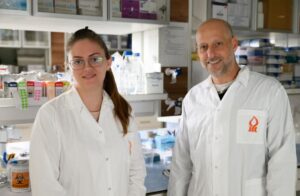
BGU Helping Children With Rare Form of Sleep Apnea
BGU Helping Children With Rare Form of Sleep Apnea
February 12, 2024
The Jerusalem Post — Prof. Gad Vatine of Ben-Gurion University of the Negev (BGU) and Dr. Avraham Ashkenazi of Tel Aviv University (TAU) have teamed up to help children with a rare form of sleep apnea called congenital central hypoventilation syndrome (CCHS). Their collaboration has yielded important new information about the cause of CCHS, which could lead to future treatments. Vatine is an expert in studying rare disorders using patient-specific stem cells, and Ashkenazi is an expert in tri-nucleotide repeat expansion disorders and protein clearance pathways.
Children with CCHS severely under-breathe when they are asleep, but breathing is not normal when they are awake either. There is no cure for CCHS, and it lasts one’s entire life. There are no medicines that will correct the under-breathing problem. Therefore, these children require ventilatory assistance for life.
To make this discovery clinically relevant, the Vatine lab at the Regenerative Medicine and Stem Cell Research Center at BGU used patient-specific stem cells, termed induced pluripotent stem cells (iPSCs). The BGU-stem cell core is the premier research facility of its kind in Israel, providing research support nationally and internationally. They use a technique called “reprogramming” that was developed by the Japanese Nobel Prize winner, Shinya Yamanaka. This technique enables easily accessible cells (like blood or skin cells), to be “taken back in time” to become identical to embryonic stem cells (ESCs).
Vatine and Ashkenazi are very excited about the potential of this groundbreaking discovery: “Now that we know what goes wrong in the CCHS patient neurons, we can start developing modalities to fix it with the goal of promoting neuron survival that will allow a better quality of life for the patients,” they concluded.




